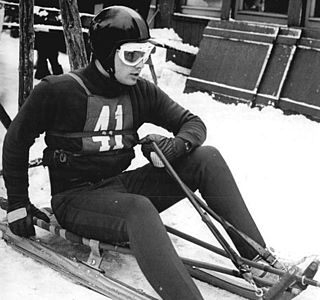| Bulgaria at the 1968 Winter Olympics | |
|---|---|
 | |
| IOC code | BUL |
| NOC | Bulgarian Olympic Committee |
| Website | www |
| in Grenoble | |
| Competitors | 6 in 2 sports |
| Medals |
|
| Winter Olympics appearances (overview) | |
Bulgaria competed at the 1968 Winter Olympics in Grenoble, France.
| Bulgaria at the 1968 Winter Olympics | |
|---|---|
 | |
| IOC code | BUL |
| NOC | Bulgarian Olympic Committee |
| Website | www |
| in Grenoble | |
| Competitors | 6 in 2 sports |
| Medals |
|
| Winter Olympics appearances (overview) | |
Bulgaria competed at the 1968 Winter Olympics in Grenoble, France.
| Athlete | Event | Race 1 | Race 2 | Total | |||
|---|---|---|---|---|---|---|---|
| Time | Rank | Time | Rank | Time | Rank | ||
| Petar Angelov | Downhill | 2:18.71 | 63 | ||||
| Giant Slalom | 1:59.87 | 67 | 2:01.96 | 66 | 4:01.83 | 64 | |
| Athlete | Heat 1 | Heat 2 | Final | |||||||
|---|---|---|---|---|---|---|---|---|---|---|
| Time | Rank | Time | Rank | Time 1 | Rank | Time 2 | Rank | Total | Rank | |
| Petar Angelov | DNF | – | 57.60 | 1 QF | 1:00.72 | 43 | 58.07 | 28 | 1:58.79 | 29 |
| Event | Athlete | Race | |
|---|---|---|---|
| Time | Rank | ||
| 15 km | Petar Pankov | 50:54.1 | 25 |
| 30 km | Petar Pankov | 1'41:42.9 | 26 |
| Event | Athlete | Race | |
|---|---|---|---|
| Time | Rank | ||
| 5 km | Roza Dimova | 19:05.6 | 33 |
| Tsvetana Sotirova | 18:27.3 | 31 | |
| Velichka Pandeva | 18:23.7 | 30 | |
| Nadezhda Vasileva | 17:58.7 | 24 | |
| 10 km | Velichka Pandeva | 43:26.3 | 31 |
| Roza Dimova | 43:18.4 | 29 | |
| Tsvetana Sotirova | 42:16.5 | 28 | |
| Nadezhda Vasileva | 41:25.8 | 27 | |
| Athletes | Race | |
|---|---|---|
| Time | Rank | |
| Velichka Pandeva Nadezhda Vasileva Tsvetana Sotirova | 1'05:35.7 | 8 |
Alpine skiing at the 1968 Winter Olympics consisted of six events, held 9–17 February at Chamrousse, southeast of Grenoble, France. Jean-Claude Killy of France won all three men's events, repeating Toni Sailer's triple-gold of 1956. Since Killy's feat, no male alpine ski racer has won three gold medals in a single Olympics..

Alpine skiing has been contested at every Winter Olympics since 1936, when a combined event was held in Garmisch-Partenkirchen, Germany.
The 2nd World Cup season began in January in West Germany and concluded in April in the US Jean-Claude Killy of France repeated as the overall champion, and announced his retirement from World Cup competition. Nancy Greene of Canada repeated as the women's World Cup overall champion, and announced her retirement from World Cup competition.

Biathlon debuted at the 1960 Winter Olympics in Squaw Valley, California with the men's 20 km individual event. At the 1968 Winter Olympics in Grenoble, the men's 4 × 7.5 km relay debuted, followed by the 10 km sprint event at the 1980 Winter Olympics in Lake Placid, New York. Beginning at the 1992 Winter Olympics in Albertville, women's biathlon debuted with the 15 km individual, 3 × 7.5 km relay, and 7.5 km sprint. A pursuit race was included at the 2002 Winter Olympics in Salt Lake City. The top 60 finishers of the sprint race would qualify for the pursuit event. The sprint winner starts the race, followed by each successive biathlete at the same time interval they trailed the sprint winner in that event. At the 2006 Winter Olympics in Turin, a mass start was introduced where the top 30 biathletes from the previous four events were allowed to start together for the competition.

The United Kingdom of Great Britain and Northern Ireland competed as Great Britain at the 1968 Winter Olympics in Grenoble, France. Great Britain did not win any medals at these games, the highest finish was fourth in Alpine Skiing.

France was the host nation for the 1992 Winter Olympics in Albertville. It was the third time that France had hosted the Winter Olympic Games, and the fifth time overall.

Italy competed at the 1968 Winter Olympics in Grenoble, France.

Switzerland competed at the 1968 Winter Olympics in Grenoble, France.

Hungary competed at the 1968 Winter Olympics in Grenoble, France.

New Zealand had seven competitors at the 1968 Winter Olympics in Grenoble, France. All took part in the Alpine Skiing events; the highest finish by a New Zealand competitor was 30th place by Anne Reid in the Ladies Slalom.

Romania competed at the 1968 Winter Olympics in Grenoble, France. The two-man bobsleigh team of Nicolae Neagoe and Ion Panţuru won the nation's first medal at the Winter Games, a bronze. As of the 2018 games, they remain Romania's only Winter Olympic medalists.

Argentina competed at the 1968 Winter Olympics in Grenoble, France.

Chile competed at the 1968 Winter Olympics in Grenoble, France.

Liechtenstein competed at the 1968 Winter Olympics in Grenoble, France.

South Korea, as Republic of Korea, competed at the 1968 Winter Olympics in Grenoble, France. It consists of 2 women & 6 men.

Klaus Bonsack, also known as Klaus-Michael Bonsack, was an East German luger who competed during the 1960s and early 1970s.

The Republic of the Congo, competing as Congo, first participated at the Olympic Games in 1964, and has sent athletes to compete in most Summer Olympic Games since then. Congo missed the 1968 Games and boycotted the 1976 Games along with most other African nations. Congo has never participated in the Winter Olympic Games.
For the 1968 Winter Olympics in Grenoble, France, a total of ten sports venues were used. Most venues were constructed between the 1964 Winter Games in Innsbruck and the 1968 Games. Thawing was an issue for the four-man bobsleigh run. They were limited to only two runs. Thawing also affected the men's 500 m speed skating event. Electronic timing in alpine skiing affected the results of the women's giant slalom event. It gave Canada's Nancy Greene a headache for two days despite her gold medal in the event.
For the 1992 Winter Olympics in Albertville, France, a total of thirteen sports venues were used. Val-d'Isère has been part of the Alpine Skiing World Cup since the late 1960s while Tignes served as host of the first Freestyle World Ski Championships in 1986. Most of the venues used were constructed between 1987 and mid 1990 with the test events taking place in late 1990 and early 1991. It was the last Winter Olympics with an outdoor speed skating rink which led to weather issues for three of the ten events. Three cross-country skiing events were run in snowstorms while the men's 20 km biathlon was found to be 0.563 km (0.350 mi) too short. The downhill events in alpine skiing were criticized for being too steep. Freestyle skiing made its official debut at these games with the men's winner being stormed after his win while the women's winner won her event in a snow storm. La Plagne hosted the skeleton World Championships in 1993 while Val-d'Isère hosted the Alpine World Ski Championships in 2009.